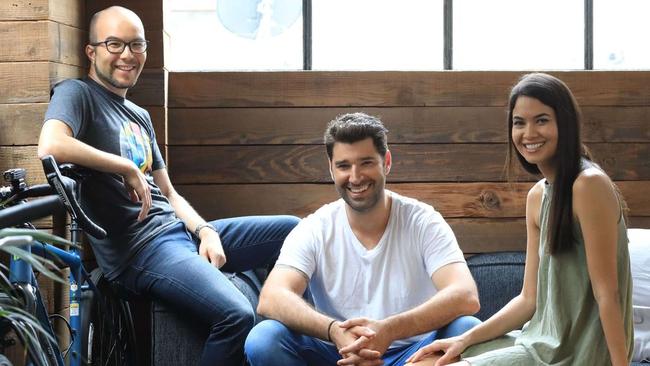Health insurer Nib to pay its staff $1200 to WFH
One Aussie company has taken flexibility to the next level, offering staff an annual payment to work from home instead of in the office.
At Work
Don't miss out on the headlines from At Work. Followed categories will be added to My News.
Australian health insurer Nib is rewarding their staff for working from home, giving them an extra $1200 a year on top of their salaries to go towards the cost of remote working.
The “disruption” of the pandemic has helped the company to embrace a radical change to the way people work.
The company is encouraging its 1200 employees to work from home at least four days a week, with staff only required to come into local office hubs for team meetings, training or social events.
New employees will also receive a one-off reimbursement of $300 to help them set up their workstation at home.
A survey of Nib’s workforce showed that 79 per cent of employees agreed that working from home enabled them to do their best work.

Nib’s chief people officer, Martin Adlington, said its new working policy reflected the health
insurer’s approach to the future of work following the upheaval of the pandemic.
“While nobody celebrates the misery and disruption caused by Covid-19, it has presented a unique opportunity to us to re-think old work practices and design principles and ultimately redefine work at Nib,” he said.
“We are very conscious however that the past 18 months is not reflective of the ‘norm’ with varying lockdowns and restrictions across the country impacting our employees’ ability to come together regularly, and we will be constantly tweaking our approach to ensure its fit for purpose once restrictions ease.”
Employees can come to an agreement with their manager on what works best for them in terms of hours and location, he added.
“For example, one person might start work earlier, so they can do the school pick up. For another, it may suit them to start work later, so they can be active in the morning,” he explained.
“By doing this, we hope to tap into much larger talent recruitment pools with the idea that our flexible working approach will become a drawcard for potential candidates. Our teams are starting to be made up of a mix of people from all different locations which is great for encouraging diversity of thought.”

Aussie company ditches the office for good
Another company, Yellow Pages publisher Thryv Australia, which has been in operation for 140 years, has scratched the office altogether with its 500 staff set to work from home on a permanent basis.
It previously occupied two levels in a Melbourne CBD office and although it has almost three years remaining on the lease, it will now sub lease the office space.
“What we learned during the pandemic is that we can operate with a high degree of productivity when employees work from home,” Thryv Australia chief executive John Allan told the Australian Financial Review.
“People told us they were happy to work from home, and it made us rethink our whole way of working.”
Two all company events will be held each year in Melbourne with interstate staff flown in, making Qantas and accommodation providers the “big winners”, Mr Allan added.

Coming to the office a few times a year
Back in April, Australian tech company Atlassian announced it would only require staff to come into their nearest office four times a year.
More then 1000 Atlassian employees have moved since the pandemic, while 1500 new hires have also been made.
Billionaire co-founder and co-chief executive Scott Farquhar said the $80 billion tech giant’s working from home policy was crucial to allow the company to tap into talent outside of Sydney and give people around Australia access to high paying tech jobs.
“So there are some businesses that said work from home two days a week but what that means is you can live in Sydney or maybe the Central Coast or stretch it out to Wollongong, but it’s not tapping into people in regional Australia or Brisbane, Melbourne or Perth,” he told news.com.au at the time.
The 5700 Atlassian employees around the globe can use into its ‘Team Anywhere’ policy and work from any location in a country where it has a corporate entity, where they have legal work rights and the time zone aligns with teams members.

Another Aussie tech giant recently followed in Atlassian’s footsteps.
Workers at Australian graphic design company Canva will only have to show up to the office eight times a year under a “radical” new flexibility policy.
It applies to all Canva’s staff including at its Melbourne, and Sydney offices in Australia, its Austin office in Texas, US, its Wuhan and Beijing hubs in China as well as a Manila office in the Philippines.
Canva’s 2000-strong Australian workforce now have the choice to basically work from home, permanently.
“We’ve all been going through a bit of radical change the last 18 months,” Canva co-founder Cameron Adams said in September.
“We’ve been using that time as a period to experiment. Some of it has been forced on us, of course. But over that period we’ve really enjoyed the flexibility.”

Ditch the 9 to 5 grind
Flexible working hours is also becoming more commonplace.
The Australian branch of financial services company Deloitte introduced a policy in July that dumped the 9-5 work week for good.
Under a new “flex” policy, staff at Deloitte can design their work week by setting their own hours.
In all, there are 12 new “flex rules”, which includes employees getting one paid wellbeing day off per year and being able to swap public holidays for cultural or religious days.
More paid leave options are available for Deloitte workers who “support local communities” by doing things such as donating blood, helping not-for-profit organisations or volunteering in the emergency services.

Working from home pay cuts
Working from home is a work perk equal to a seven per cent pay rise, an Australian Productivity Commission report revealed, which found that some employees would be willing to take a pay cut in return for working from home permanently.
But the Commission warned that working from home during the Covid-19 pandemic is putting staff at greater risk of “burnout’’ or “slacking off”.
However, it found that most workers save an hour a day, on average, in commuting time when able to work from home and would choose to go to the office just two or three days a week.
Productivity Commission chairman Michael Brennan said 40 per cent of Australians workers are working from home during the pandemic, compared to just 8 per cent previously.
Over in the US, Google employees who continued working from home faced cuts of up to 25 per cent from their salary.
Staff at Silicon Valley start-up Stripe said in September that workers who moved to work elsewhere permanently would get a one-time bonus of $US20,000 ($A26,000) – but also a permanent salary cut. Many of the company’s 4000-plus workers took the deal, which saw their salary slashed by 10 per cent.
More Coverage
Originally published as Health insurer Nib to pay its staff $1200 to WFH





